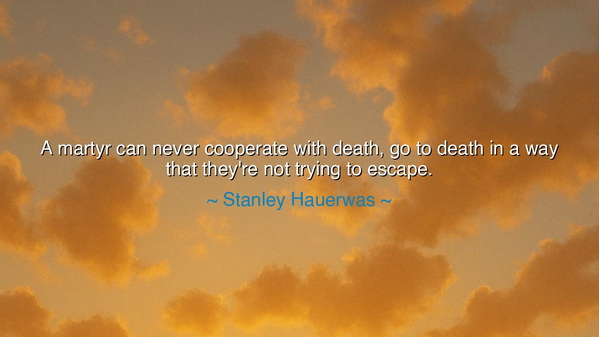
A martyr can never cooperate with death, go to death in a way
A martyr can never cooperate with death, go to death in a way that they're not trying to escape.






In the solemn and penetrating words of Stanley Hauerwas, theologian and moral philosopher, we encounter a truth that pierces the very heart of courage and faith: “A martyr can never cooperate with death, go to death in a way that they’re not trying to escape.” These words carry the gravity of centuries—the weight of those who have stood before violence and refused to bow, those who faced the terror of the end not as seekers of death, but as lovers of life so pure that they would not betray it, even unto the grave. Hauerwas reminds us that the martyr is not one who seeks destruction, but one who resists it by clinging to truth, dignity, and fidelity until the very end. Death is not their goal—it is the price they pay for life’s highest meaning.
Stanley Hauerwas, one of the great moral theologians of our age, has long reflected on the paradox of Christian witness, the tension between sacrifice and survival. His words emerge from a life spent contemplating the courage of those who endure persecution without hatred and who face suffering without surrender. In this quote, he draws a distinction that is both subtle and sacred: the difference between cooperating with death and accepting it. The martyr does not rush toward death with despair or longing; rather, they walk steadfastly toward it because truth, justice, or love demands it. They are not allied with death—they are its contradiction. They die not because they seek to die, but because they refuse to cease living rightly.
To “cooperate with death,” as Hauerwas warns, is to give in to its dominion—to allow fear, apathy, or nihilism to rule the heart. But the martyr resists even in dying. They do not seek escape, for life itself, even when it is broken, remains holy. This is why their witness carries such power: in their final moments, they affirm that death does not rule them. They go to their end as free souls, not slaves of fear. Their act of dying becomes an act of living fully—of refusing to betray the light that dwells within. In this way, martyrdom is not a surrender to death but a rebellion against it, a proclamation that life and love are stronger than the grave.
Consider the example of Socrates, that ancient teacher of wisdom, condemned to die by poison for “corrupting the youth” of Athens. He could have fled into exile, but he refused to escape, not out of pride, but out of fidelity to truth. To him, running from death would have been to betray philosophy itself—to cooperate with the fear of death rather than confront it with reason and peace. When he drank the hemlock, he did not seek death; he accepted it as the final consequence of a life lived in integrity. Thus he became, in the words of history, a martyr of truth, one who proved that the soul’s freedom is beyond the reach of tyranny.
In the Christian tradition, too, this truth finds its deepest expression in the story of Jesus of Nazareth. When He walked toward Calvary, He did not go as one who desired death, nor as one overcome by despair. He went as one who would not deny His Father, nor abandon the path of love and redemption. Even as nails pierced His hands, He did not yield to hatred or hopelessness. He went to His death not to cooperate with it, but to conquer it. In His resurrection, the symbol of divine triumph, death itself was unmasked as powerless before the steadfastness of divine love.
And so, across time and culture, we find in every true martyr a reflection of the same eternal defiance: the refusal to be ruled by fear, even when life’s end draws near. The martyr’s courage is not found in the desire for suffering but in the strength to remain faithful amidst it. They teach us that the measure of a person’s life is not how long they live, but how deeply they live—how unwaveringly they hold to what is right. They remind us that even when the body fails, the spirit can remain unconquered.
So, my children of the living age, take this teaching to heart: do not cooperate with death. Not merely the death of the body, but the many small deaths that creep into the soul—cynicism, hatred, apathy, despair. Resist them all. Do not seek escape from the hardships of life, but face them with courage and compassion. Stand firm in your truth, even when the world scorns it; hold fast to love, even when it is costly. For every time you choose kindness over cruelty, hope over hopelessness, truth over comfort—you live as the martyrs lived. You deny death its dominion.
Thus, as Stanley Hauerwas teaches, the martyr’s power is not in dying, but in the way they live unto death. They do not flee from life, nor seek its end; they meet it with eyes unafraid, hearts unbroken, and faith undiminished. Follow this example. Live so fully, so truthfully, that even when death comes—as it will—it finds you not its servant, but its master. For to die without cooperating with death is to live forever in the realm of the undying.






AAdministratorAdministrator
Welcome, honored guests. Please leave a comment, we will respond soon